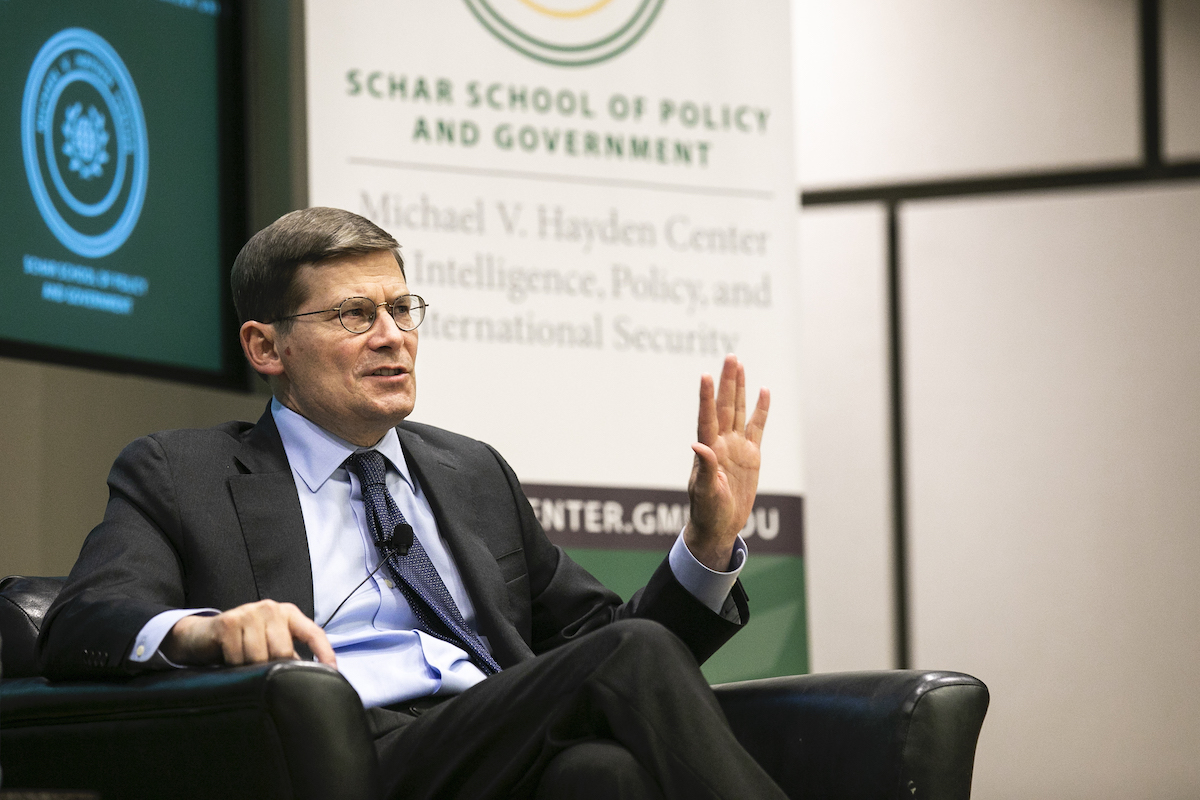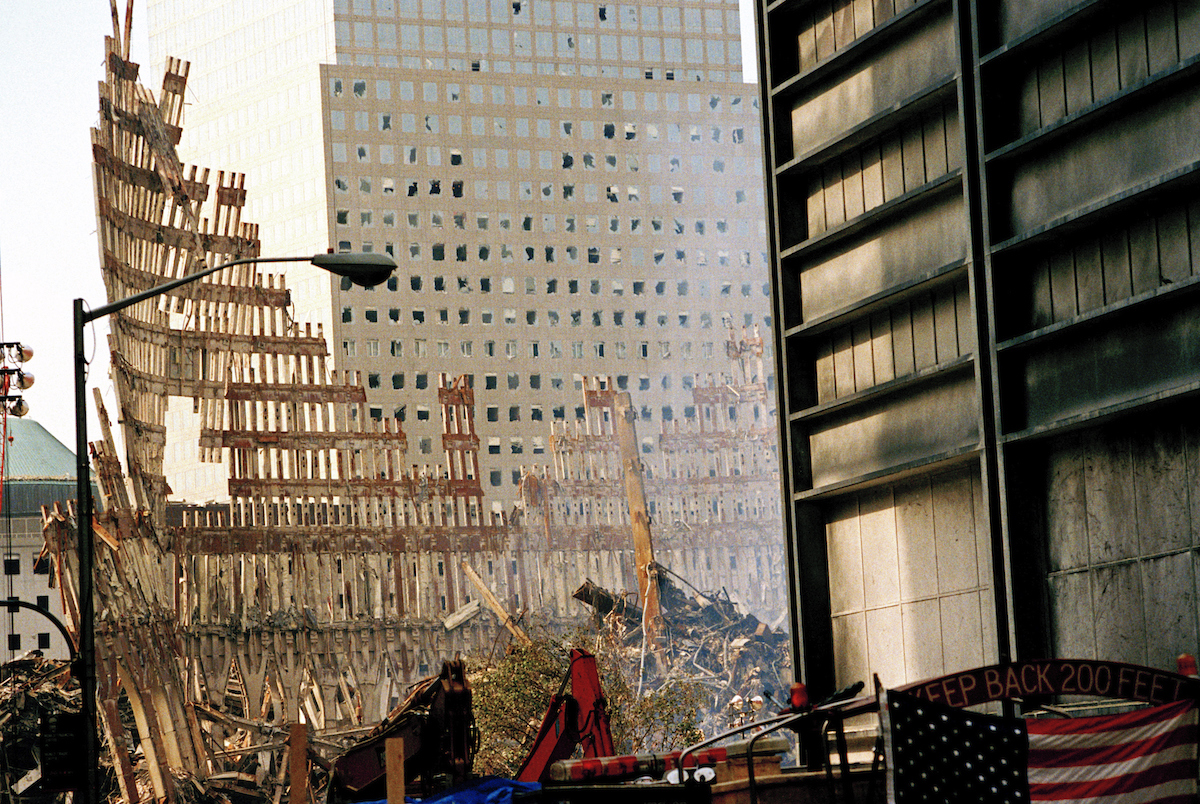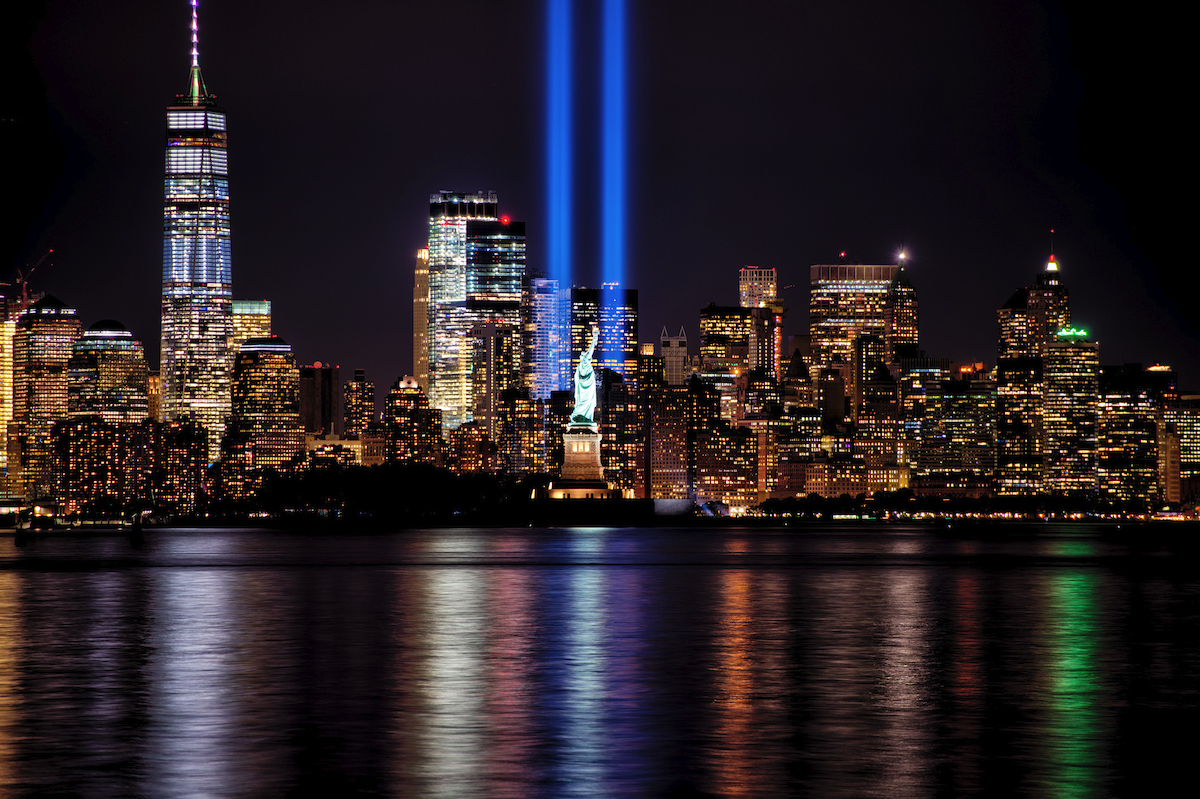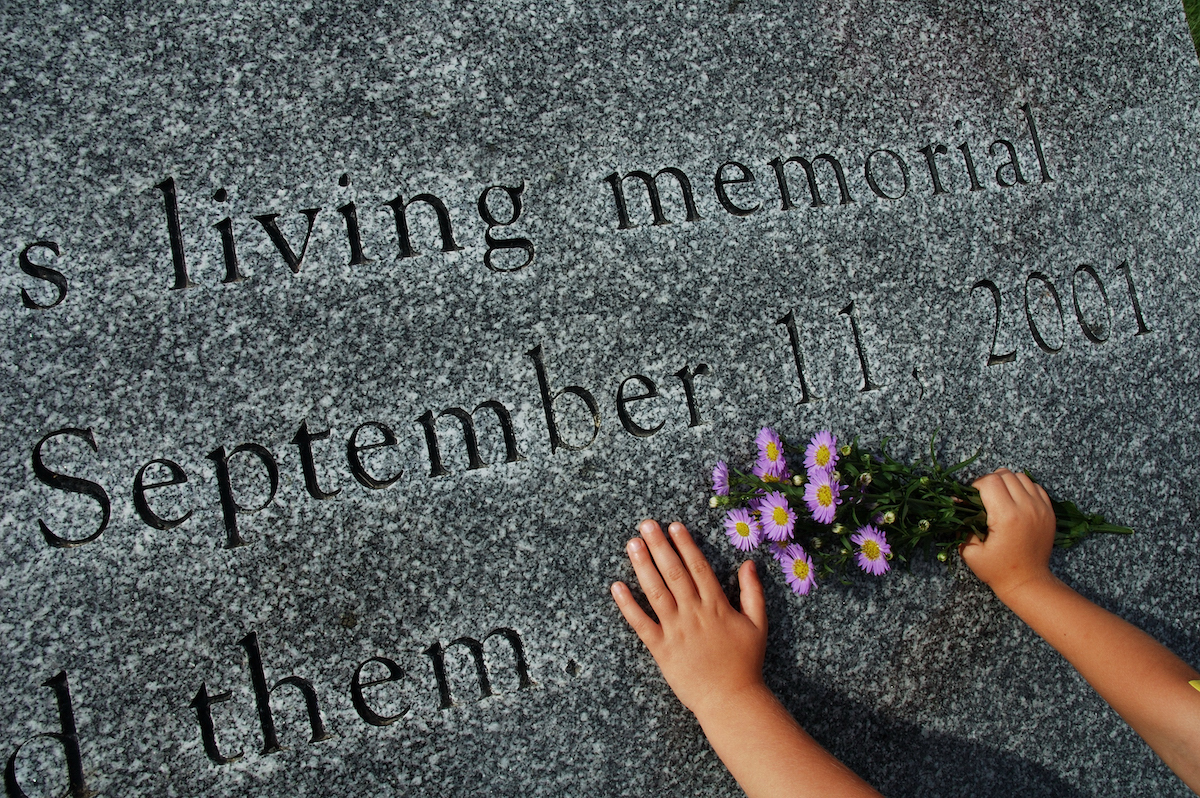
Michael Morell is the only person who was with President George W. Bush on Sept. 11, 2001, when the 9/11 attacks occurred, and with President Barack Obama on May 2, 2011, when Osama bin Laden was killed.
Morell, a Distinguished Visiting Professor at George Mason University’s Schar School of Policy and Government, is still one of the country’s leading national security professionals.
During his 33-year career at the Central Intelligence Agency, he served as deputy director for three years and twice served as acting director.
He received the Presidential Rank Award for exceptional performance—the nation’s highest honor for civilian service. He also received the Distinguished Intelligence Medal, CIA’s highest award, for his role in the bin Laden operation.
Today, he is a senior national security contributor for CBS News and hosts the popular CBS News podcast, “Intelligence Matters.”
His book, “The Great War of Our Time: An Insider’s Account of CIA’s Fight Against Terrorism—From al-Qaida to ISIS,” was published in 2015 and was a New York Times bestseller.
We are grateful to Morell for taking the time to share his memories and insights with The George.

Twenty years after the 9/11 attacks, what sticks with you the most, both emotionally and visually?
There are a couple of moments that are etched in my memory. One is on Air Force One on Sept. 11, President Bush looking me in the eye and asking me, "Who did this?" I told him I thought that when we got to the end of the trail, we’d find al-Qaida and bin Laden. I told him I was so confident in that that I would bet my children’s future on it.
I also remember getting back to the CIA that night. I remember dozens and dozens and dozens of people at the gate. Some of them were current workers who had been sent home earlier in the day because George Tenet, then the director of Central Intelligence, had evacuated the building fearing a plane might hit it. And these current workers were saying, "Hey, we want to come back. We want to work. We want to help. We want to do anything we can.” And what was even more moving was former employees, people who had retired years earlier, standing at the gate saying, "I want to come back. I want to help. I’ll do anything."
Fast forward, I remember in August of 2010, when the head of our Counterterrorism Center said to [CIA Director Leon Panetta] and me, after a routine meeting, "I need to see the two of you alone." So we went back to the director’s office and he told us that “We found a guy that we call Abu Ahmed al-Kuwaiti, who we believe is a courier for bin Laden. And we found where he lives.” When you saw this place, with 12- to 18-foot walls topped with barbed wire, and all sorts of other security features, and no television and no phone and no wi-fi, and families that don’t leave the compound, kids don’t go to school, they don’t put the trash out. I remember the hair on the back of my neck standing up as the first real possibility that I had seen that maybe, just maybe, we had found bin Laden.
I remember the day that we got bin Laden. But I remember even more, to bring us full circle here, President Obama, knowing I was with President Bush on 9/11, asking me to go to Dallas after the bin Laden raid and brief President Bush on it. So I took with me the lead analyst to tell the intelligence story, and I took with me the lead military planner for the raid, to tell the raid story. We spent two and a half hours with President Bush, and he was like a kid in a candy store. He wanted to know every single detail. And at the end he got up and walked over to his desk and pulled out one of his challenge coins; the military has these challenge coins that they share with each other, different units. And he slapped it in my hand and shook my hand, and I could see closure in his eyes. And when I looked at the coin, it was his Commander in Chief challenge coin, which he had never given to me before.
You were part of an extraordinary event. How did you balance the intensity of doing your job with the surreal aspect of the moment?
The surreal is happening all around you, literally. I remember getting back to Air Force One from the school [in Sarasota, Florida, where President Bush had been speaking]. Air Force One was ringed with Secret Service officers with their weapons out. Not their handguns, but with their long guns. It looked like soldiers on a battlefield. I had never seen that before. Everybody’s bags were being searched. They searched my top-secret briefcase. I didn’t say a word.
As we were landing at Andrews [Air Force Base] that night, the president’s military aide was looking out the windows on the left side of the aircraft as we were approaching. He called me over and said to look out. There was a fighter jet on our wingtip. He said, “That’s an F-16, and there is another one on the other wing tip.” The F-16 was so close you could see the pilot. You could see the pilot’s facial features, and you could see the pilot looking at us, and in the distance, you could see the still-smoldering Pentagon. Then he said something to me that still sends shivers up my spine. He asked me if I knew what their mission was. He said their job is if someone fires a surface-to-air missile at us on final approach, their job is to put themselves between that missile and the president of the United States.
So the surreal is all around you, and it’s happening, and it feels surreal. But you have a job to do. I had multiple interactions with the president that day. And while you feel the surreal, I don’t think it in any way got in the middle of me doing my job. In some ways it motivated me even more.

The narrative was the CIA at that time was, and I know you’ve heard this phrase, “asleep at the switch” when it came to the attacks. Is that a fair assessment?
It’s not fair. The CIA was created to prevent strategic surprise. And I don’t think in its entire history that CIA has ever done a better job providing strategic warning than it did on al-Qaida and bin Laden prior to 9/11.
We first identified bin Laden in 1992 as a financier of terrorism. By 1996 we identified him not just as a financier, but as a terrorist himself, as the leader of this group called al-Qaida. We told people he wanted to drive the United States out of the Middle East. We told people he wanted to depose Sunni rulers he saw as puppets of the United States and replace them with Islamic leaders. We told people that his plan to accomplish all this was to attack us anywhere he could, in particular in the Homeland. And even as early as 1996 we told people he wanted to acquire weapons of mass destruction in order to do that. And those warnings just got louder and louder and louder.
So quite the contrary to conventional wisdom, I don’t think there’s ever been a time where CIA has spoken more loudly and more repeatedly about a threat than it did about al-Qaida and bin Laden prior to 9/11.
Where does the next great terrorist threat come from, a Taliban-controlled Afghanistan or from domestic terrorists?
We are far safer today than we were on Sept. 10, 2001, from foreign terrorists. They have been degraded. We do a good job of watching them with precision intelligence, and when they start getting stronger, the United States has routinely acted militarily to keep them degraded. And we’re going to have to do this in Afghanistan going forward. So much safer today.
There are groups in the world I’m currently worried about. Al-Shabaab in Somalia, ISIS in West Africa, ISIS in Iraq, and Syria is starting to bounce back. And we’re going to have to watch al-Qaida in Afghanistan because the Taliban is going to give them safe haven, and they are going to try to reconstitute.
But the question about domestic terrorism is a great one. As we sit here right now, I’m more worried about a significant domestic terrorist attack similar to the Oklahoma City bombing than I am about a 9/11-style attack from foreign terrorists.

What do you believe will be the legacy of 9/11?
Every president believes that their fundamental job is to protect the American people, job No. 1. The gap between job one and job two is not even close. And so the fundamental goal of President Bush after 9/11 and President Obama and President Trump and President Biden was and is to protect the American people, and from that perspective, the legacy is that we were amazingly successful after 9/11.
Despite attempt after attempt after attempt by al-Qaida to conduct another attack in the Homeland, they failed to do so until only very recently, the attack in Pensacola by the Saudi Air Force pilot who was training there. We’ve had internal attacks of radicalized people, so-called lone wolf attacks, but from the outside that’s the first attack. So, again, we have been wildly successful ensuring that multiple presidents now have done their fundamental job.
But I think there is some truth to the idea that America is weaker today as a result of all of this. The Iraq war wasn’t necessary, and it really cost us. It divided America politically; it still divides America politically. And I think about a series of wrong policy choices in Afghanistan by multiple administrations and the trillions and trillions of dollars spent and a significant loss of credibility. We lost the war. We lost another war. And the way it ended, even more lost credibility. I think there’s some truth to the idea that what bin Laden did on 9/11 has damaged us.
And the other thing to think about is that for 20 years we were fighting counterterrorism and a related counterinsurgency wars, and we weren’t focused on our peer competitors, China and Russia. And during those 20 years, China was catching up economically, and both countries were catching up to us in terms of conventional military capabilities—so much so that the last National Defense Strategy Commission, on which I served, came to the conclusion that if we had to fight a war today against China or Russia in their backyard, that we would struggle to win and could well lose that war because of what’s happened the last 20 years.
So I think there is an argument to be made that we are weaker.
What gives you hope?
You know, we’re in a pretty dark place right now, specifically politically, we’re in a pretty dark place. Our democracy is not functioning, let’s not kid anybody here. That’s the bad news. The good news is that America has shown itself over and over and over again to be resilient. And I do two things today in my retired life that drive that home to me.
One is I spend a lot of time with startups, particularly high-tech startups that offer something to the national security community. And when you spend time with these startups you are blown away by the entrepreneurship, the innovation, the creativity, the success of these companies. There’s nobody else in the word that has this kind of entrepreneurial capability.
The other thing I do is I spend time in college classrooms, and I’m blown away by the students. I’m blown away by how smart they are. I’m blown away by their passion for the country. I’m blown away by their belief, which I want to feed, that they can make a difference.
Those two things give me hope. Those two things are examples of our resiliency. So do I think we’re doomed? No, I don’t. I think we’ll bounce back, but it’s going to have to be done by this new generation, and it’s going to have to be done consciously. It won’t happen any other way.
